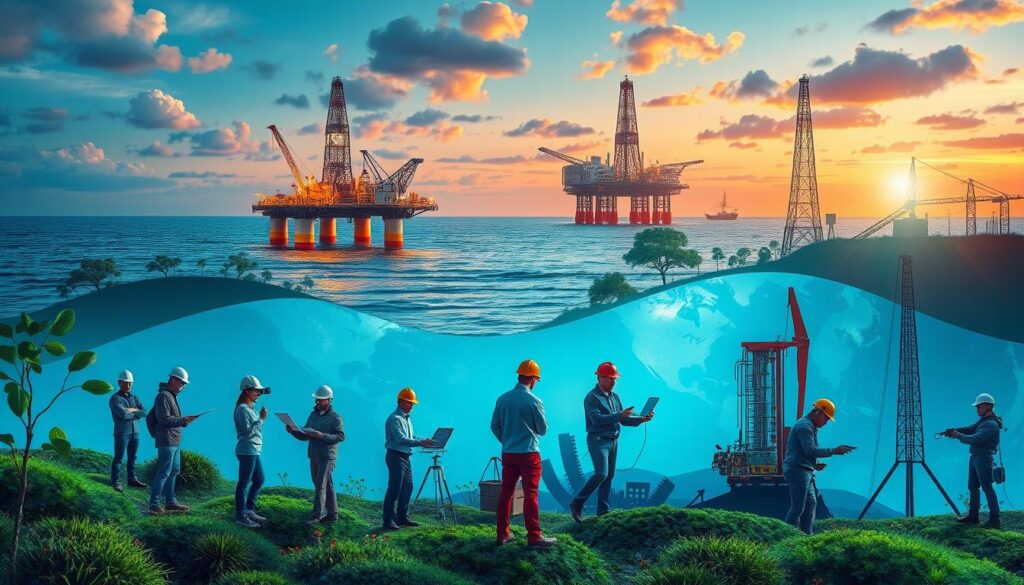The future of petroleum engineers is at a turning point. By 2040, the world might produce between 80 to 130 million barrels of oil daily. This shows how important this job is, even as renewable energy grows.
The field of petroleum engineering is changing fast. Jobs are expected to grow 2 percent by 2032, with about 1,200 new positions each year. This change shows the energy sector’s complex challenges, from old oil methods to new, green ideas.
Petroleum engineers are now key problem-solvers in the energy world. They work on new extraction tech and carbon capture. These efforts are changing how we get energy and care for the planet.
Key Takeaways
- Petroleum engineering remains a critical field with steady job growth
- Global energy demands continue to drive opportunities in the sector
- Technological innovation and sustainability are reshaping the profession
- Petroleum engineers are adapting to emerging environmental challenges
- Specialized skills in digital technologies are increasingly valuable
Current State of the Petroleum Engineering Industry
The oil and gas industry is at a turning point in 2023. It’s changing fast because of new technology and shifts in global energy use. Petroleum engineers are now facing new challenges and chances in the energy world.
Energy scenes around the world are changing fast. Petroleum engineers are moving away from old ways of getting oil. Top schools are teaching students to use new tech and green practices in their work.
Global Energy Demand Trends
Energy use patterns are changing globally. The share of oil and gas in energy is falling. This change shows the need for new ideas in petroleum engineering.
Employment Growth Projections
The job scene for petroleum engineers is changing. There’s more focus on digital skills and caring for the environment. Schools in the USA are teaching students to mix old engineering skills with new tech like AI.
Regional Industry Development
The petroleum engineering field used to be mainly in the USA, Saudi Arabia, and Russia. But now, it’s growing in new places. About half of today’s engineers think they’ll need to learn about sustainability by 2025.
The future of the industry depends on being able to adapt, use new tech, and care for the planet. Petroleum engineers are becoming key players in making energy sustainable.
What is The Future of Petroleum Engineers?
The future of petroleum engineers is changing fast. This is due to global energy shifts and environmental issues. With about 94 million barrels of oil produced daily, these experts are learning new tech and sustainable ways.
Renewable energy is changing the field. Petroleum engineers are now looking for ways to reduce harm to the environment. They are learning about CO2 storage and better oil recovery methods.
| Career Projection | Key Metrics |
|---|---|
| Petroleum Engineering Graduates (2022) | 660 |
| Projected Graduates (2025) | 572 |
| Professionals Viewing Energy Transition as Opportunity | 80% |
The field is going through big changes. Emerging technologies like drones for methane checks and advanced CO2 methods are opening new doors. About 75% of those surveyed think fossil fuels will still play a big role in energy.
Petroleum engineers are getting better at capturing and storing carbon. They are also learning about green extraction. The Gulf Coast is a great place for CO2 storage, offering chances for growth.
Essential Skills and Qualifications for Modern Petroleum Engineers

The world of petroleum engineering needs a mix of technical skills, digital know-how, and care for the environment. People in this field must have a wide range of skills. These skills go beyond just drilling.
Good petroleum engineers need to be well-rounded. They should have skills in many areas. The best ones come from top universities and show they can handle different tasks.
Technical Expertise Requirements
Knowing a lot about technical stuff is still key in petroleum engineering. Engineers need to understand geology, thermodynamics, and fluid mechanics. They also need to know how to manage reservoirs well.
| Core Technical Skills | Proficiency Level |
|---|---|
| Drilling Technologies | Advanced |
| Reservoir Analysis | Expert |
| Geological Interpretation | Comprehensive |
Digital and Analytical Competencies
Today’s petroleum engineering needs strong digital skills. People in this field must know how to work with data, make predictions, and use advanced software. Getting a degree in petroleum engineering now means learning about technology and how to use computers.
Environmental Management Skills
Looking after the environment is very important in the oil industry. Engineers have to find ways to extract oil that don’t harm nature. They need to use practices that are good for the planet.
Staying up-to-date and being able to change is crucial. The best petroleum engineers will use their technical, digital, and environmental knowledge together.
Emerging Career Paths and Specializations

The field of petroleum engineering is full of exciting and varied career options. Modern engineers can explore many specialized roles beyond traditional drilling and extraction. Roles like reservoir engineering and sustainable energy solutions are just the start.
Career paths in this field include:
- Reservoir Engineers
- Production Engineers
- Drilling Engineers
- Field Engineers
- Research and Development Specialists
Salaries in petroleum engineering are very attractive, ranging from $80,000 to over $200,000 a year. Roles like reservoir and natural gas engineers often earn more because of their complex technical skills.
Graduates from top petroleum engineering colleges can improve their career chances with strategic professional growth. Getting certifications from groups like the Society of Petroleum Engineers (SPE) and gaining experience through internships can really help.
Key professional growth strategies include:
- Obtaining professional engineering (PE) licensure
- Completing annual professional development courses
- Gaining hands-on experience in diverse environments
- Pursuing advanced certifications
The world of petroleum engineering is always changing. There’s a growing focus on sustainable extraction and reducing environmental impact. Those who keep up with these trends will lead the way in global energy innovation.
Conclusion
The world of petroleum engineering is always changing. Despite ups and downs in oil prices and shifts towards cleaner energy, there are still many chances for growth. New tech like AI and digital tools is changing how engineers find and extract oil.
Even as the world moves towards cleaner energy, fossil fuels will still be key for a while. To succeed, petroleum engineers need to learn more than just technical stuff. They should get good at digital skills, understand how to care for the environment, and be ready to adapt quickly.
For those in petroleum engineering, never stop learning and improving. Knowing how to use automation, handle big data, and help with green energy will set you apart. With good pay and lots of job options, this field is full of chances for those who are ready to learn and grow.
The future of petroleum engineering is about making things better, not just replacing old ways. By using new tech, caring for the planet, and being flexible, engineers can help meet our energy needs and push the industry forward.



